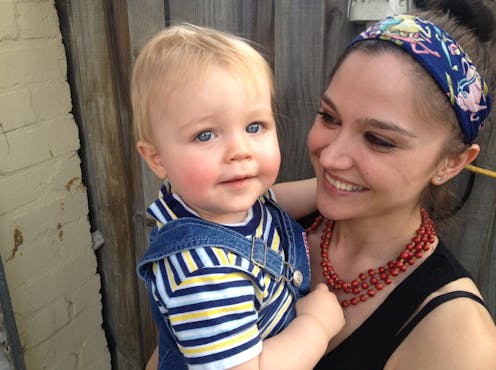‘I’m on my way home from work when my baby turns into a dragon’. Ariane Beeston’s postpartum psychosis gave lie to the romance of motherhood
- Written by Catharine Coleborne, Professor of History, School of Humanities, Creative Industries and Social Sciences, University of Newcastle

Ariane Beeston smashes the romantic myth of motherhood in her memoir Because I’m Not Myself, You See. In 20 short, gripping, sad and moving chapters, Beeston explains her frightening experience of postpartum psychosis and depressive illness as a new young mother.
Beeston is a Sydney-based writer and psychologist who formerly worked in child protection. Her memoir shares an enormous field of knowledge, lived experience and memories, including reflections and conversations with people who supported her through episodes of mental illness following the birth of her son, Henry, in 2011.
Review: Because I’m Not Myself, You See – Ariane Beeston (BlackInc)
Beeston first experienced symptoms of perinatal distress soon after his birth, which worsened over time. Baby Hen, as she calls him, appears to her as a dragon when he is a few months old, only three weeks after she returns to child protection casework.
I’m on my way home from work when my baby turns into a dragon. We are standing at the lights of a busy intersection, waiting to cross the road. […] It’s not the first time it’s happened. I’ve seen dragons before – in the cot, the swings, the highchair. But this one is angry and fierce and red.
Passages like this one are powerful and make this a brave book. It is also a generous book, allowing vulnerability and openness about postnatal mental illness to act as a flash point for other parents, mostly women, to see themselves in her story. Most of all, it reveals the profound loneliness of mothering.
Becoming a mother can shatter a woman’s sense of self. It can disrupt work and career trajectories and redefine relationships from the intimate to the most public of encounters. A woman’s bodily identity, sexual identity and professional identity can be reduced to almost nothing: to the nurse or doctor who is focused on her child, she becomes “mum”.
In Beeston’s account, her professional life working with the New South Wales department of community services, where she has taken babies away from their mothers, becomes a risk factor leading to her heightened sense of fragility following childbirth. She becomes hyper-aware of her own parenting.
From psychologist to ‘patient’
In her job as a departmental psychologist Beeston had to intervene in the most heart-rending of situations where children were potentially at risk, either because of parental “dysfunction” or issues like drug addiction.
These work experiences stay with Beeston as she has her own newborn. She becomes extra vigilant about his health and wellbeing, with her anxiety running high about nappy rash, breastfeeding and sleep patterns. The palpable shame and fear her narrative conveys is relatable and insightful.
Beeston’s account of her difficulty with breastfeeding will resonate with so many mothers who have struggled with this supposedly “natural” process, trying to get their baby to feed from sore and leaky nipples while stressed. Many new mothers have sought the help of lactation specialists and midwives and can feel they have failed if they “give up” too soon in favour of bottle feeding:
‘He just won’t latch on’, I text my mum. ‘Did you ever have this problem?’Oh no, I never had any problems …Gosh, I remember breastfeeding one of you while cooking dinner …Despite my experience of hotlines, I have never phoned one in my life. But I am desperate.
At first, Beeston writes, she tried to keep her hallucinations and delusions secret. But ultimately, she sought help and was admitted to the mother and baby unit of a psychiatric ward when Henry was 8-months-old. They stay there for three weeks. It was not the last time she needed to be hospitalised.
One of the things I like most about this book is the way Beeston is open about eventually seeking help, from hotlines, but also from her partner, Robb, and from her empathetic and smart psychiatrist Dr Q. These relationships feel like warm and practical hugs.
Beeston left her role in the department not long after her second hospital admission when her son was 15 months old.
Ultimately, over time, she learns to manage the illness with the help of regular psychiatric treatment and psychotherapy, medication for depression and anxiety, her family and ongoing support groups. She learns to love activities like ballet again. And she reads voraciously about experiences of motherhood.
You can feel Beeston’s heart swell when she writes about an older, now teenage, Henry talking to her about her experience and learning he had spent time in hospital with her as a baby, and visited her in treatment when he was two.
Part memoir, part self-help book
Feminists have written about the myths associated with motherhood, in particular, the unattainable goal of being a “good mother”: beyond criticism, always tidy, ready to please and to discipline her children in the right measures.
Motherhood is, as Beeston reminds us, a “rearrangement of the self”. We tell ourselves stories about becoming a mother to remind ourselves what happened, and to order and arrange it. At the time, the experience of new motherhood can be a blurry confused period, clouded by lack of sleep and hormonal highs and lows.





